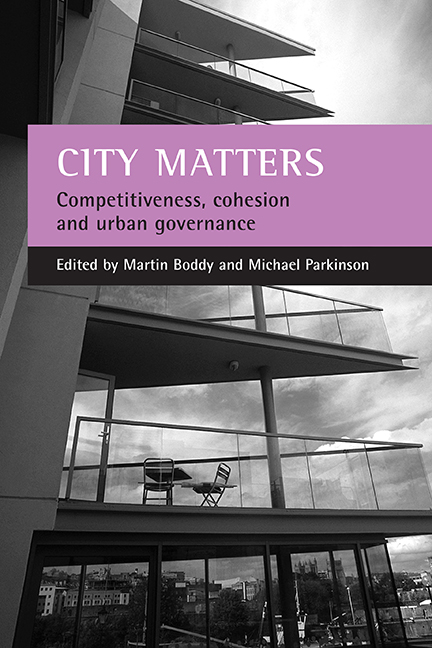Book contents
- Frontmatter
- Contents
- List of tables and figures
- Foreword
- Acknowledgements
- Notes on contributors
- one Introduction
- Part One Competitiveness, cohesion and urban governance
- Part Two Competitiveness and urban change
- Part Three Competitiveness, innovation and the knowledge economy
- Part Four Housing, property and economic performance
- Part Five Space, place and social cohesion
- Part Six Ethnicity, enterprise and social cohesion
- Part Seven Leadership, governance and social capital
- Conclusions
- Index
sixteen - Whose hidden assets? Inner-city potential for social cohesion and economic competitiveness
Published online by Cambridge University Press: 20 January 2022
- Frontmatter
- Contents
- List of tables and figures
- Foreword
- Acknowledgements
- Notes on contributors
- one Introduction
- Part One Competitiveness, cohesion and urban governance
- Part Two Competitiveness and urban change
- Part Three Competitiveness, innovation and the knowledge economy
- Part Four Housing, property and economic performance
- Part Five Space, place and social cohesion
- Part Six Ethnicity, enterprise and social cohesion
- Part Seven Leadership, governance and social capital
- Conclusions
- Index
Summary
This chapter takes up two themes within contemporary academic and policy debate on the regeneration of poor urban areas. The first theme concerns the extent of social capital within such areas. We argue that there is substantial endogenous or hidden social capital in some poor areas, but that this is often isolated from wider power structures and, hence, insufficiently recognised and used in regeneration initiatives. The second theme focuses on the emergence of multicultural and creative enclaves within some inner-city locations. Here the presence of entrepreneurialism and creativity have been identified and lauded as key elements of successful revitalisation. We suggest, however, that much of the implied optimism about the impact of newly discovered ‘creative entrepreneurialism’ needs to be reconsidered.
With respect to social capital development, the current local policy discourse has emphasised particular, normative types of networks and associational activity, perhaps to the exclusion of others. The networks and associations that are recognised are largely those conforming to a greater or lesser extent with norms of participatory social interaction, contributing to conventional forms of local social capital. Likewise, the forms of behaviour that are seen positively to contribute to creative entrepreneurialism fuse social networking, trust and risk taking with core values of competitive economic activity. Before discussing our findings and policy implications, a brief review of interpretations of social capital and creative entrepreneurialism is appropriate.
The presence or absence of social capital has emerged as a prominent explanation for differential levels of social and cultural cohesion found in particular areas of cities. As Stoker argues (Chapter Twenty of this volume), social capital is created out of social networks and associational activity which require reciprocal relationships, accepted norms, shared values and sanctions to be acted out between trusted individuals (Schuller et al, 2000). Social capital is now widely perceived by social scientists and policy makers as a significant asset or resource within communities of all kinds, whether they are communities of place, interest, profession or identity. Lack of social capital, it is implied, contributes to social exclusion. Hence, it is argued that sustainable regeneration of poor areas necessitates the regeneration of social capital alongside physical and economic investment in housing, employment training, job creation and so on.
- Type
- Chapter
- Information
- City MattersCompetitiveness, Cohesion and Urban Governance, pp. 287 - 306Publisher: Bristol University PressPrint publication year: 2004



